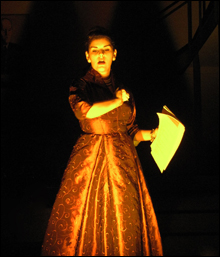
SHE'S IN CONTROL Samantha Brilhante in Hedda Gabler. |
Bad girls these days may act out more flamboyantly than the anti-heroine namesake of Henrik Ibsen's
Hedda Gabler, which is being staged through November 7 at Providence College. But Hedda makes up in shrewdness what she lacks in spectacle.
As exemplars of Scandinavian brooding, Shakespeare had his Hamlet and Ibsen had his Hedda. As a Brit, the Bard of Avon was looking from the outside in at the melancholic Dane, keeping anguished introspection under the dramatic spotlight. Writing from within Norwegian society, Ibsen was more interested in Hedda as a social phenomenon, so he broadened the beam to cast light on the entire category of Heddas, so to speak, her whole 1891 cohort of neurotic, underutilized middle-class wives.
Angell Blackfriars Theatre director Mary G. Farrell sets the drama in the 1950s, signaled by a couple of Danish modern chairs and scenic designer Kathryn Kawecki's sleek period living room. It's dominated by a striking portrait of Hedda's dour father in his general's uniform. The '50s certainly were a repressive time for American women, though there aren't statistics on what percentage were as ill-intentioned as Hedda.
Frustrated at not being able to control her own life, she tries to control others. That pretty much sums up Hedda's style and substance. She wasn't a feminist or a suffragette; she represented why they were bound to come into existence.
The play opens with Hedda (Samantha Brilhante) at a point in her life that most young women of her time would see as wonderful. Freshly returned from her honeymoon, Hedda has just moved into an expensive house that her academic husband, George Tesman (Brendan Hickey), can't really afford. He is unofficially assured of getting a professorship, however, and his wealthy Aunt Julia (Erin Fusco) is still supporting him. Hedda's cruelty is one of the first things we see, as she pretends to think that a new purse on a chair, which the aunt is proud of, is so ugly it must have been left by her maid (Grace Curley).
George feels that his appointment to the university is secure until he learns that a former academic rival in his obscure niche of historical research is back in town. Eilert Lovborg (Kevin Lynch) had nearly destroyed his career through alcoholism, but he's now recovered and productive. Thea Elvsted (Cat McDonnell), whose children Eilert has been tutoring, comes to the Tesman home to express concern about that recovery. Hedda's culminating act to protect her husband's position, and her security, will be to destroy Eilert. Her initial step, but hardly the most harmful one, is to challenge him to drink again, which triggers a downward spiral.
Ibsen wisely doesn't give Hedda a female confidante, which might suggest an emotional bond, but rather a male one. Judge Brack (Ted Boyce-Smith), a friend of the family, is as much a watchdog as an advisor. In this milieu of social propriety, he helps her keep up appearances. (As with Thea and Eilert, separately married, infidelity is not an option with Judge Brack. The playwright has bigger dramatic fish to fry.)